The 2012 ICCA Finals
On April 28, 2012, Town Hall in New York City hosted the International Championship of Collegiate A Cappella Finals. Before we get to the review, here’s a brief summary of the event:
The Competitors:
ICCA West Champions, The UCLA ScatterTones
ICCA Midwest Champions, University of Chicago Voices in Your Head
ICCA Northeast Champions, Yale University Out of the Blue
ICCA Mid-Atlantic Champions, The Penn State Pennharmonics
ICCA Wildcard Champions, The University of Southern California SoCal VoCals
Voice Festival UK Champions, King’s College London All the King’s Men
ICCA South Champions, The University of Georgia Accidentals
Guest Group: Delilah
Emcee: Dave Brown
Sound by: Liquid 5th
Photos from the show, courtesy of our own Will Browar, are available now via our Facebook page.
Port Washington High School Limited Edition, the co-ed third place finishers from the ICHSA Finals, opened the night with a performance of Gavin DeGraw’s “Not Over You.” Wonderful charisma on this soloist and a lot of personality from the group. One of the truest highlights of this group is its fullness of sound, including an incredibly rich bass vocal and tight percussion. Having the top high school finishers perform at this show is one of my favorite developing traditions for the ICCA Finals—a way of exposing the high school groups to a broader audience and giving these kids the experience of performing on what amounts to an international stage. Part of what was cool sitting close the stage was that, far more than performance nerves, you saw smiles on these young singers’ faces, drinking in the experience of this opportunity and their accomplishment.
Next up was Centerville High School Forte, the first runners up for the ICHSA crown. The group sang Parachute’s “Something to Believe In.” Great power moment as the group ripped loose on both the sound and visually on the first chorus. I really dug the female solo on this number, which helped differentiate it from other renditions of this same song in a year when it’s been quite popular for collegiate groups to cover. Excellent perc and excellent precision, even on a relatively free-flowing song. The group didn’t choreograph a lot per se, but when they did get moving so much of it was legitimately movement driven, which has a lot more dramatic impact than the touch-step sort of stuff many groups settle for. Excellent performance.
The UCLA ScatterTones were the first competitors of the night. The group took the stage in black and pink. High tempo, unaccompanied intro from the soloist before the perc kicked in, then little by little additional voices came in on the intro to “C’mon Talk” by Jarle Bernhoft. The group implemented some cool, subtle, dramatic movement—enough to keep it from being static without ever going into the realm of the over-choreographed. Something as simple as group members in two rows leaning in opposite directions is so much more interesting than everyone leaning the same way—it was these subtle adjustments that made the group look sensational on this opening number. Great perc and bass, and the ladies carried high parts quite nicely. Awesome, dramatic fall out moment for the soloist and rhythm section to run the show again. While I worried the group might have spent just a little too much time with too few voices, the arrangement led to a couple nice, well-controlled, sudden swells of sound. Fun breakdown section with four guys up front executing some insane harmonies. The piece felt like a closer so I was really interested to hear where they might take the set from there.
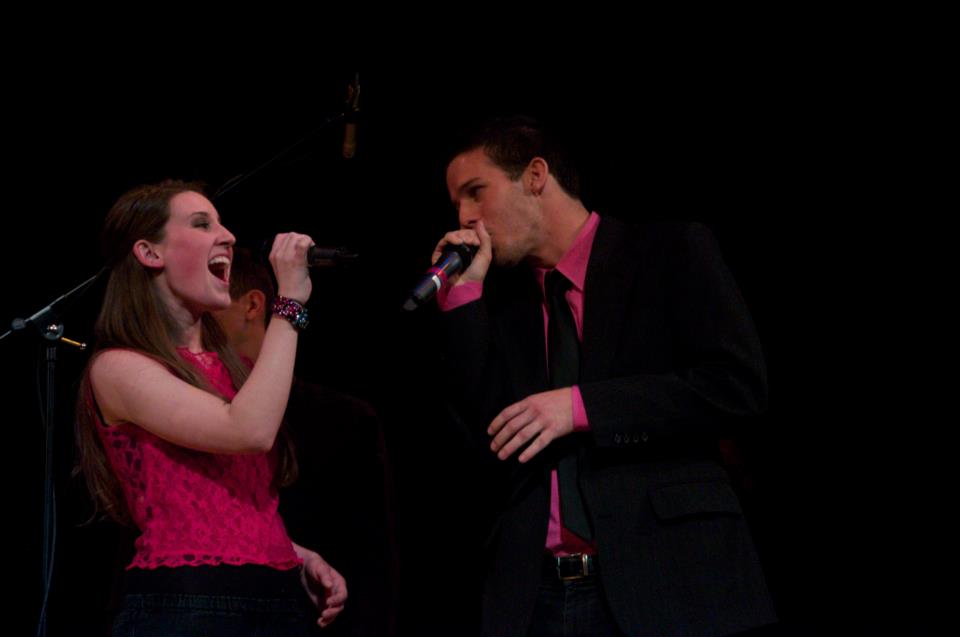
The group followed with Bob Marley’s ”No Woman, No Cry”. The piece started very softly, with some incredibly warm chords. Very vulnerable male solo in the spotlight, which presented a really pronounced contrast from the preceding song. I consciously tried not to learn of groups’ sets before Finals so I could go into this show as objectively as possible. I know this song well, but I just couldn’t place what they were singing until the chorus for how
The ScatterTones closed with Beyonce’s “End of Time.” The women took the lead, first on a three-part unaccompanied lead, then four other women joined them before the perc keyed in and the whole group got in motion to launch into the verse of the song. I liked the way in which this opening played off of a quasi-theme of the set with parts coming and falling out. Killer perc and bass again. There was a ton of movement on stage, and this was exceptionally well choreographed to look fun and free-flowing despite being carefully planned. The group did a phenomenal job of spotlighting different stars as the piece moved along with different female soloists taking over and the tempo constantly in flux. Awesome high-speed doubled up solo. There were so many parts of this song that had so much potential to fly completely out of control, but the group demonstrated remarkable poise and skill in keeping every piece of it at bay. Great slow motion movement, spotlighting the percussionist. Awesome money notes in the late stages of the song, particularly with the lead showing outstanding breath support. This was a well-diversified set packed with a certain, almost intangible aura of sound that screams ICCA Finals. It’s almost frustrating for a set like this to open the competition, because where on earth is the night going to from there?
Where is the night going to go? Why where else but to sweet home Chicago, because University of Chicago Voices in Your Head took the stage next. The mixed group had a really fun look with the women in black dresses and different colored stockings; the guys in black suits, white shirts and different colored ties. They opened with Rihanna’s “We Found Love”, starting with members lining opposite side of the stage while two members interacted in the middle. The lines crossed paths to meet up with opposite gender pairs, aside from one both-male set. Ridiculous swell of sound from softness to soaring unisons. Incredible blend and control there. This was such a creative, almost classical, choral interpretation of a song that’s anything but. It would be easy to play up those differences for laughs, but Voices in Your Head was too busy sounding phenomenal to bother with all of that. The visual story here was really provocative with group members getting right in each others faces in borderline uncomfortable ways. I talked to some fellow audience members who had wanted the group to sing out to the crowd more, but I think generating this level of intimacy, and such a sensual quality on stage really worked in selling this group’s dark, edgy, and intense identity. The sound was incredibly clean, and when the perc keyed in, it felt like a moment—dramatic and huge. What an opening number!
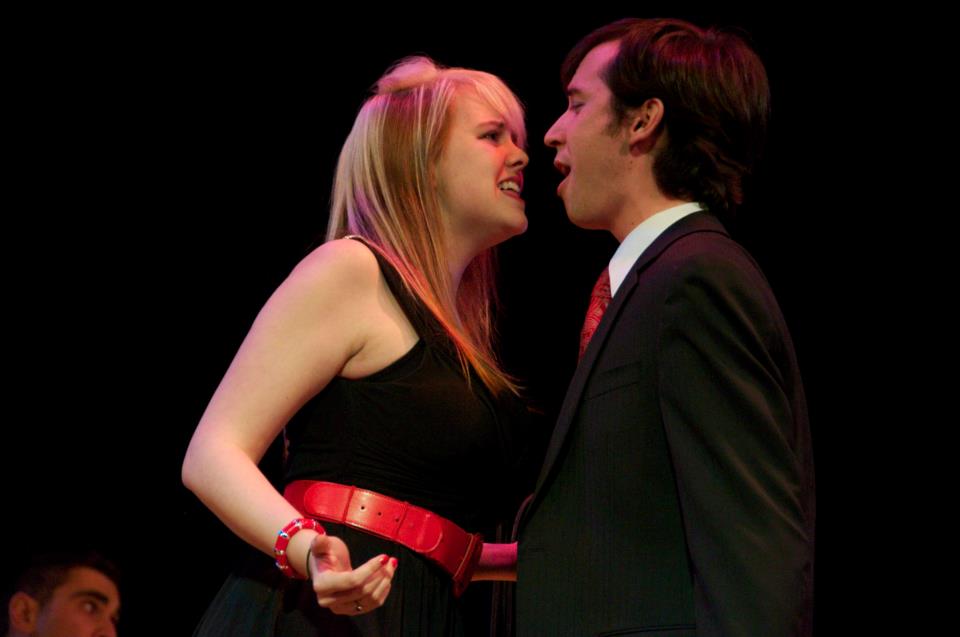
The group transitioned seamlessly into some more traditional contemporary instrumentation for David Guetta and Sia’s “Titanium.” While there weren’t true soloists for “We Found Love,” I loved the sense of continuity the group instilled by having two visual leads for that first song who turned out to the be the two soloists for the songs to follow. More on that later. Absolutely stellar female lead on this song. The group clustered in a triangular formation--really cool dramatic bend and reach choreography from the group. Incredible choreography moment with the clustered group bobbing in a wave, with fist pumps. It was one of those moments that aligned so well with the music and was so unique that the audience couldn’t help itself from cheering midway through. Cool stuff. Great perc. Awesome control on the dynamics, letting the belting really mean something. Neat effect with group members sliding the mics from side to side to create a wave of sound illusion. I’ve heard the effect is all the more rich and pronounced when the group used its own microphones at semifinals; it remained a neat idea here. I don’t mean to diminish the musical accomplishment of this, one of the top songs of the night, but I do have to continue to laud how well this all worked visually. I loved the way in which the group insisted on keeping the soloist in the driver’s seat, leading the charge on dramatic motions, pulling the strings to lean the group backward and forward—so tight, so in synch. This was simply sublime.
The group stopped and posed while the crowd applauded, with the second lead glaring at the third lead—her partner from the first song. Something as simple as passing off a microphone became a symbolic act in this set. The group moved on to Mumford and Son’s ”Little Lion Man.” Again, I loved the degree to which the solo mattered not only for his charisma and singing ability, but for the way in which the group bent to him. It made such a difference for all the group members to be facing the soloist, in turn, directing the audience’s attention in that same line of vision. The lead bobbed his way around the group, ending up in the middle—such a cool visual. I’ve heard mixed reactions to the group’s choice to cover this song, and particularly on the lyric change to “I really mucked it up this time.” There were three choices available—singing the curse word (and probably getting penalized for it), changing the lyric as they did, or, most obviously, picking a different song. While this certainly wasn’t my favorite song choice from the group, I did think it was strong, and that the lyric shift was subtle enough that someone who didn’t know the song might not have caught on. I was prepared to give it all a pass. Great use of dynamics again as the group fell out. I would have trimmed the instrumental section of this a little, but I credit the group for using that time to their fullest advantage, building from softness to a swell of sound with more and more and more voices added on to back the lead on the melodic line and the perc adding some punch to the music. The group clapped its way into the climax which saw the female lead reprising lyrics from “We Found Love” while the male lead carried on with the Mumford solo. Between the initial seamless transition, the use of the same two leads throughout, and the reprise of the opening song during the finale, this came across as exactly the sort of coherent, almost narrative set that I hope to hear at the ICCA Finals level. That, my friends, is what can separate any old quarterfinal winner from a set that legitimately vies for an ICCA Championship. Excellent finish to an elite set.
Yale University Out of the Blue took the stage next. The co-ed group wore black and, you guessed it, blue. They opened on Christina Perri’s ”Jar of Hearts.” Great texture and tone on the lead here. Soft, precise sound on the opening from the group. Nice swell of sound, and great dynamic control. The blend was excellent--perfectly regulated to keep the parts even and integrated with one another. Soaring high parts on the bridge. The group went for a big moment on the unison—that’s the only part where things seemed to fall a smidge out of tune. Nonetheless, the group settled down quickly to arrive at a very nice closing moment when the soloist sang unaccompanied.
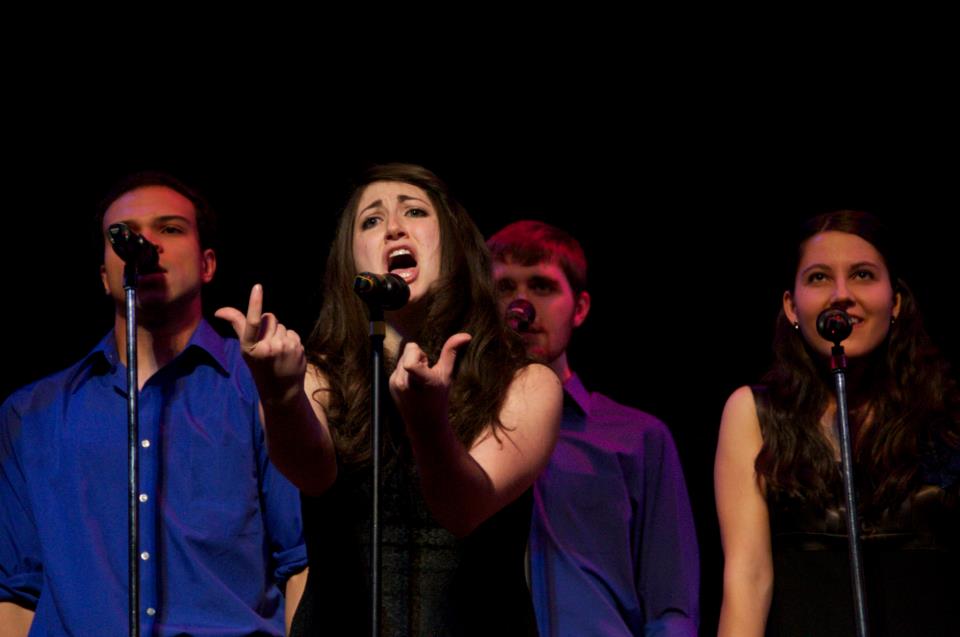
Some folks disapprove of the call to start a set with a slow song, but I maintain that every set is different, and you need to wait for the full story to be told before rendering a decision about how successful a given part was. This set was a case study on that very topic, as the first song may have come across a little too even-keel, but the group positively electrified the crowd on the transition to Christina Aguilera’s “Something’s Got A Hold on Me.” Sensational solo, and some very cool sound effects behind her—particularly the woman on trumpet. The group broke the piece down to almost sound like gospel music for a bit. Before long, we were getting pieces of “Candyman.” I just loved the charisma and dramatic control from this soloist, who had the capacity to get huge, and proved it time and time again. Awesome three-part female lead in the end game. Very good middle song.
The group moved on to pose—sitting, kneeling, heads down. I’m all for dramatic staging but, on a nitpicky note, I would have liked to have seen the transition to this formation have followed more organically from the preceding song, rather than seeing everyone stop and strike their poses so purposefully as they set up for a separate piece. In any event, Out of the Blue closed with “Bottom of the River” by Delta Rae. The soloist came forward, singing unaccompanied at the start. Nice stomp percussion, before three backing singers joined the lead. The body perc became a recurring theme with the ladies up front patting and stomping to lend an almost tribal feel to this piece, and the effect spread throughout the group. The intensity, both aurally and visually, was off the charts here, though I couldn’t help but notice the soloist more often than not smiling as she sang. I know a number of singers for whom that they’re default expression when they sing, and while it doesn’t take away from the awesome vocals, it does send a mixed message visually to the audience when the song is not a happy one. Moving along, cool four-part lead on the breakdown as the sound positively exploded—the sound would fit a battle scene in any major motion picture. All in all, I loved that the group found its own style and voice, growing more intense with each given piece of the set, rather than having an ebb in the middle—that’s smart, thoughtful and different set construction. Out of the Blue definitely belonged as a Finals level group, and while I didn’t envy them the task of following up the back-to-back showstoppers that were The ScatterTones and Voices in Your Head sets, they nonetheless made a very strong accounting of themselves under less than ideal circumstances.
The Penn State Pennharmonics closed the first half of the show. Nice, warm swell of sound from the group on the intro, accompanied by a steady, dramatic turn. The group executed a really neat effect with their swell building incrementally, then cutting off, with just a soft, high hum remaining to build from again. Ordinarily, I balk at visible cut offs, but the group executed them dramatically enough to make it feel like part of the dramatic presentation rather than a visual necessity, which was really smart. Muse’s “Uprising”, featuring a healthy sampling of Pink Floyd’s “Brick in the Wall,” was a really intense, off-beat opening song selection. Too often, groups choose to compete with songs that have been covered for years (or that sound like they could have been); song selections like this assert the era—we’re in the second decade of the 2000s and this exactly the sort of modern sound beyond the reach of this generation’s aca-ancestors. I loved it. Good, steady perc here and a solid solo. The dramatic movement was a nice touch—not so much choreography as pulsing intensity.
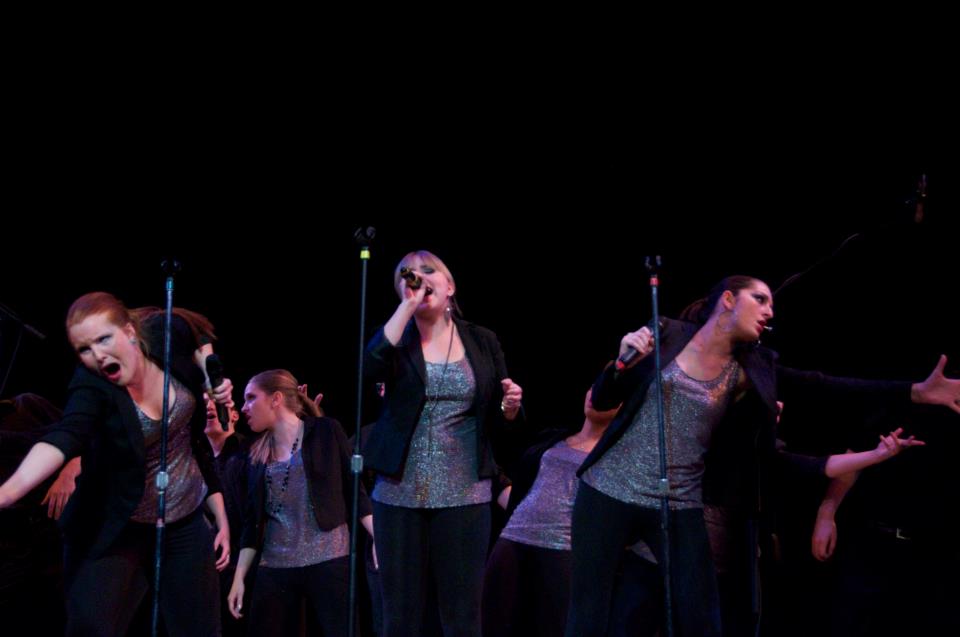
The soloist stayed up front to lead into the second song with a repetition of “I’m in, I’m in.” Cool way of making transition to “I’m In Here” by Sia. Wonderful restraint on this solo, starting with a sound of dramatic weariness and desperation. Nice control and continuation of an alternative edge to the sound. I dug the addition and subtraction of voices to move the piece along. Lovely high harmony from a three-part female lead. Nice explosion of sound on the plea, “is anyone out there listening to me?” The softer parts of this nicely set up the explosions of sound—it wasn’t the most subtle use of dynamics, but I’ll be darned if it wasn’t effective. Lovely moment with the soloist singing unaccompanied as the group members turned their backs to her, then the men turned and chorally sang a follow up apology to the lead.
These apologies marked the transition to “Sigh No More” by Mumford and Sons. Excellent dramatic transition. Very strong solo on this one, highlighted by the way in which he looked genuinely hopeful on lyrics like “[love] will make you more like the man you were made to be.” Great swells of sound again—the repetitions inherent in the song really lent themselves well to the group’s inclination to build layers upon layers of sound. When groups select songs to cover, and particularly to bring to competition, they need to think about far more than chord structures and personal preference—they need to think about which songs complement their own talents and identity—that may be what was strongest about The Pennharmonics set, and particularly this closer. Very nice transition to the clap along moment. Sure, in the broader context of the Finals, this set didn’t come across quite as epically as it did at semis (or, I imagine, at quarterfinals). Still it made a real statement, introducing a new set of faces to The Finals stage who we’ll hopefully hear much more from in the years ahead.
After intermission, Oakland School for the Arts Vocal Rush, the new ICHSA champions, took the stage to sing Alice Russell’s “Let Us Belong.” I simply loved the solo here. These young women offer up such astonishing smoothness and richness of sound, particularly for just seven singers (and keeping in mind they’re all in high school). Simply insane. This is an act that will stand up on any stage in the world, as evidenced by the fact that it was not one bit out of place on stage at the ICCA Finals. Watch out collegiate groups—the future is here.
The University of Southern California SoCal VoCals opened the second half of the competition. The coed group took the stage with women in silver dresses, the guys in black vests and slacks, white shirts and red ties. Really interesting fake out intro with a soloist at the front, only for the women behind him to step forward and sing at him on the intro to ”Set Fire to the Rain” by Adele. Interesting choice, too, to have a male lead on this one—and, boy, did the guy have great breath control. Sensational dynamic range here with a pure explosion of sound on the chorus. While the choreography read a little trite to me with raises and drops of hands, they delivered it with a certainty and power that made it pop. Dubstep remix where the second chorus would have gone. Very creative. This piece was all about undermining expectations (underscored by the fact that they had actually changed their opening song since semifinals). All in all, a tight, original take on a song selection that easily could have come across as played. Nicely done.
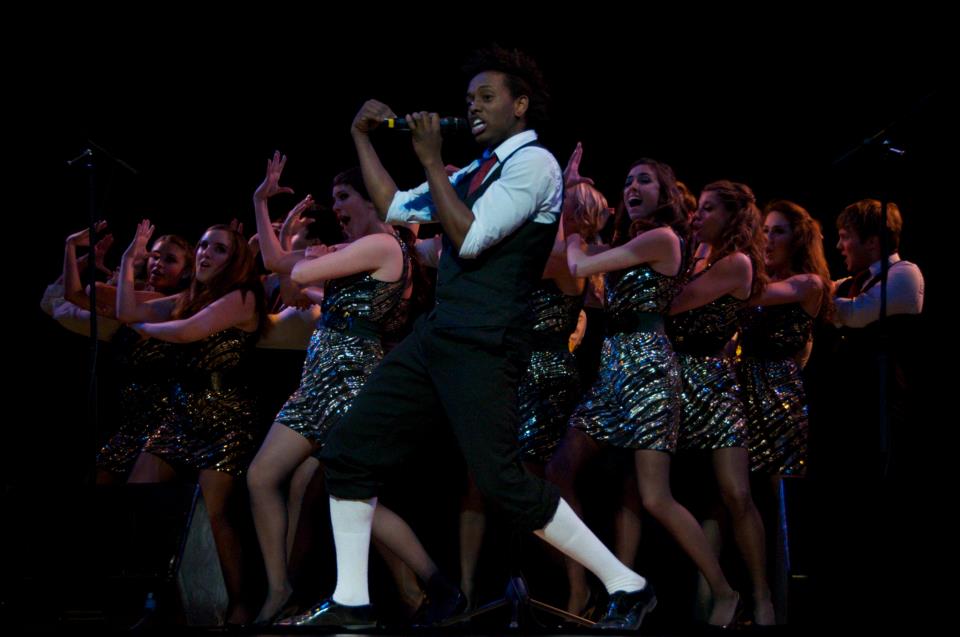
The group followed with ”Poison and Wine” by The Civil Wars, featuring rotating soloists. Part of what’s so deceptively hard about this is kind of arrangement is the absolute purity of the backing sound even as they rotated through the lead, losing and gaining parts over the course of the piece. Five-part choral lead on the first chorus. The high end ran the show in the early stages of the song, but the low end took over the next verse. Some of the high harmonies were just killer. The addition of the percussion seemed to aim at adding another dimension to the song, but the actual sound felt a little thrown in there to me. The piece shone brightest on the choruses, when the conflicted lyrics “I don’t love, you but I always will” recurred, the form synching up with the function of having so many people take the lead, representing all the thoughts that might pass through the group’s collective mind. As beautiful as it was, a performance like this raises quite a few questions. As plenty of long-time ICCA Finals attendees have pointed out, this performance felt quite similar to the SoCal Vocals’ treatment of “Crazy Ever After” two years, if for no other reason than the way in which the revolving door of soloists functioned. The question remains—is an artful, challenging performance any less impressive because it’s a little less creative than it was the first time you heard it? Was the second American Pie film inherently weaker than the first because it leaned upon essentially the same jokes as the original? Was the 1990s Bulls threepeat from 1996-1998 less impressive than the run from 1991-1993 because Michael Jordan and Phil Jackson had already ironed out their wrinkles the first time? Where on this spectrum do you place an a cappella dynasty like The SoCal VoCals? I still haven’t decided for sure myself, but I have two-part answer for now that’s no less conflicted than the song itself. On one hand, every piece of art and every artist is derivative of something and someone else. If it’s done well, that’s the bottom line—The SoCal VoCals do what they do very, very well. On the other hand, if you’re competing on collegiate a cappella’s biggest stage, for the richest prize on the circuit, I prefer to see innovation—I want to walk away remembering 2012 as the year “X” happened in New York; not a year that feels tacked onto its more readily distinguishable preceding years. Food for thought.
The SoCal VoCals closed with Janelle Monae’s “Tightrope.” As good as the group was, and as much as the VP guy served as an engine to drive his piece forward, this song was, first and foremost, a showcase for soloist Oluwasegun Oluwadele. In prelude to the song, he rolled up his pants and pulled up his long white socks. Well, when you pop a crowd just by pulling up your socks, I would say you have the “it factor.” His vocals and stage presence more than lived up to the intro as he ripped into the vocals and maneuvered from side to side, owning the stage en route to the dramatic climax of him walking an imaginary tight rope. Outstanding precision as the group broke it down for a moment, singing in unison with incredible rapidity. This closer marked a near-perfect fusion of stunning vocals, awesome staging and the best lead of the night to assure everyone in attendance that this group came to play and was very much staking a new claim to the ICCA throne.
Next up were All the King’s Men from King’s College of London.The all-male group took the stage in blue collar shirts and black slacks. Their first song was Lady Gaga’s ”Born This Way.” Fun choral opening before the soloist stepped forward. Something about British charm does make Gaga, and the male falsettos that come with it all a bit more palatable than the guys going Gaga thing that became a cliché in the US the last couple years. Nice dynamic work, dying down on the end of the chorus for some very precise unisons, and a very slick swell of sound at the end of the second verse. Though there was little choreography, the guys grooved and clearly had a lot of fun on stage. The piece ended with the guys slowly stepping into a line, then into a V-formation with a new front man at the fore, for a soft, slow sample of “Edge of Glory.” The original soloist came up and retook the mic to take it home, exhibiting some really nice vocal range in the process.
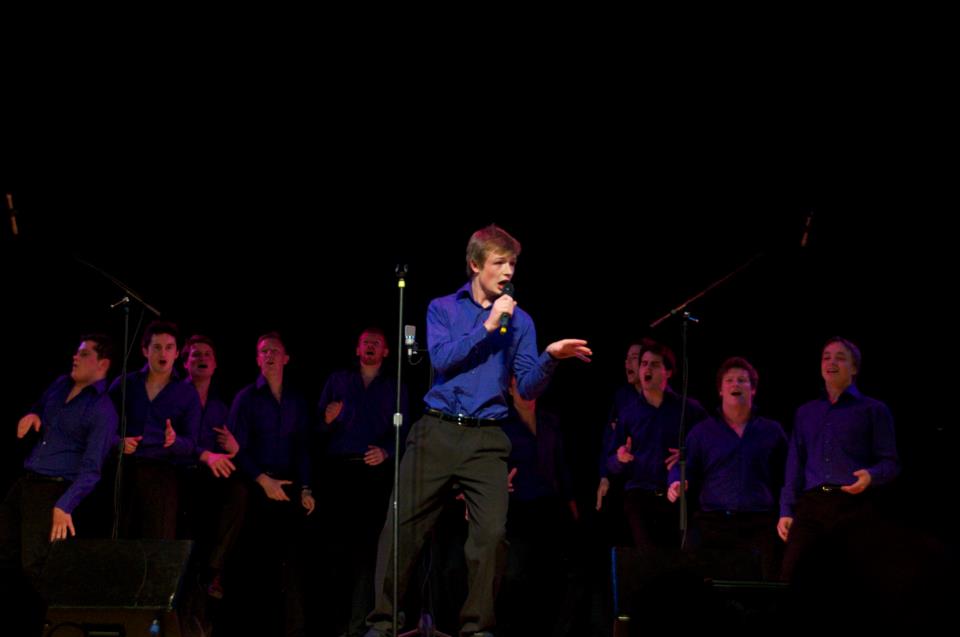
The guys followed with Leonard Cohen’s ”Hallellujah” Don’t get me wrong, because this song itself is probably in my top twenty all-time favorites (I’m partial to the Rufus Waiwright cover), but it has been interpreted so extensively in American collegiate a cappella that it’s really fallen out of relevance for me. All the same, the guys offered up some very pretty harmonies. The group keyed in with some nice, warm bell tones leading into the second verse to give the piece some movement and came in with some nice swells of sound to add depth to the piece. Very good precision and control all around, and the high harmonies were particularly impressive for an all-male group. Nice crescendo over the course of the third verse. Very clean cut offs. Despite my reservations about the song selection, part of what the group demonstrated really well was the potential for a group to positively master it music. Even if a song is a bit played, if you can execute every measure of it perfectly, you can justify that performance choice.
The guys finished with The Weather Girls’ ”It’s Raining Men,” which opened with a neat bob at the knees for the guys to move in circles, then turn dramatically in rows. Very fun dance breaks throughout this, complete with pelvic bends and stop-motion poses. The arrangement was relatively bare bones. The guys got to the crux of the piece when they transitioned to a sample of Robbie Williams’s “Let Me Entertain You”--the piece was all about charisma and getting the crowd to clap along. This was very entertaining and charming, and I don’t want to diminish the guys’ tuning or dynamic range. But with all of that said, the set nonetheless left me hungering for meat. Polished musical performances deserve praise, and there’s no question this is a stellar a cappella group. Heck, hundreds of all-male groups around the States should probably be studying this set to learn how they can still make great music while being funny. Just the same, putting this set on the stage with the best a cappella groups from across the US, I couldn’t help feeling All the King’s Men were missing some of the edge and ingenuity I’ve come to expect at the International Finals. I certainly do hope to hear much more from this group in the years ahead, but if there’s one progression they can make based upon this experience on the New York stage, I hope that it’s to seek out some different sounds and develop a more unique identity on stage.
The University of Georgia Accidentals finished up the competitive portion of the evening. The all-male group took the stage in hoodies and jeans and opened on Justin Beiber’s ”Never Say Never.” The guys brought such a fullness of sound to the stage, anchored in a positively sick bass and incredible percussion—not to mention a top-flight soloist. The movement on this song was positively electric—just so visually dynamic with every single person in motion for almost every moment of the song, but without the choreography ever feeling contrived. Awesome stomp-clap move that I wish the guys would have stretched out just a little longer to have really showcased it. And then came the dubstep. I can just imagine The Accidentals sitting in someone’s living room, downing a few cold [soda]s and one member saying “you know what would be awesome? If we did this!” and his groupmate raising the stakes, “but it would be even awesomer if, after that, we did this!” How else does a group go from such a visual show to a stomp routine to a dub step breakdown to the single best aca-rap I heard all year (culminating with in the proclamation, “you’ve got the north, got the west, we’re the dirty south)? Sometimes, you throw every idea at the wall, and every last one sticks. This is the sort performance for which you genuinely get the sense these guys are saying to themselves, “hey, we have 12 minutes to make a legacy—let’s leave it all on the stage.” Excellent, electrifying opening song.
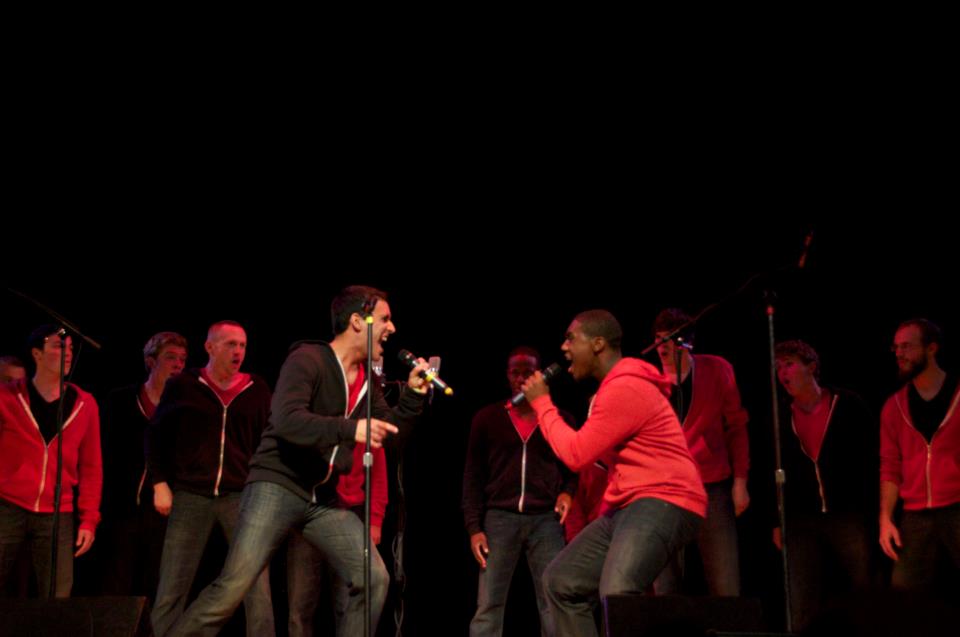
The guys followed with Simon and Garfunkel’s ”Bridge Over Troubled Waters.” Great visual transition as the guys clustered at the end of the preceding song—it seems every top group in the south has mastered this art of transition as of late. Simply sterling sound from the group, and a simply lovely solo. Incredible precision—how do you progress from the most choreographed song of the night to the softest, stillest piece? Awesome versatility from the group. I loved the addition of the soft percussion going into the second verse. Here’s one of those rare cases when you take a cliché song choice, add texture, and put your own spin on it to make it not only relevant, but make every person in the house want to run and listen to the original again. It was a performance of rediscovery. The guys grooved into the late stages of the song, sounding more like the Aretha Franlklin version, with a few touch steps and swells of sound into unisons with the soloist still one hundred percent steady in the fore. Middle songs don’t get much better than that.
The guys grooved into the percussion as the crowd was still applauding. Great theatrical movement on the opening to Parachute’s “Something to Believe In.” Part of what was great about this song was that, on the surface it wasn’t so different from the opener—an upbeat, dance-infused song with a stellar solo. Just the same, this piece had an altogether different feel. Some of that’s a result of the visual presentation—the choreography was still there, but still secondary to the sheer movement of the group, making this feel like less of a production and more of a party. The rhythm section was unreal on this one. Excellent doubling on the solo—in one of those really rare genuine moments on stage, the two leads high fived one another. While I’m pretty sure it was planned, it felt authentic, and made the song feel a lot more like street music. This was just so much fun. The Accidentals thrived off of a true richness of sound, and an ability to make the very most out of song selections that (particularly for the first two pieces) conventional wisdom would tell you to steer clear of. Excellent set.
While the judges deliberated, Delilah, of Sing-Off fame, entertained the crowd. As Hannah Juliano, also of Pitch Slapped and Musae, pointed out, it’s pretty sick to observe that members of this group had competed in different formations and even against one another on the ICCA Finals stage in the past, from groups including Pitch Slapped, Noteworthy, and Divisi. Their set included “Heartbreaker,” “Survivor,” “Whataya Want from Me,” “Fallin’” into “If I Ain’t Got You,“ “Grenade,” “How to Love,” and “Dream On.” Part of what distinguishes this group is that it doesn’t only offer up insane harmonies and firepower, but also the sensational bass sound of Johanna Vinson, the likes of which most all-female groups just can’t deliver. And while this is the truest definition of an all-female aca-all star team, I still need to say it: Amy Whitcomb is a friggin’ rock star. Period.
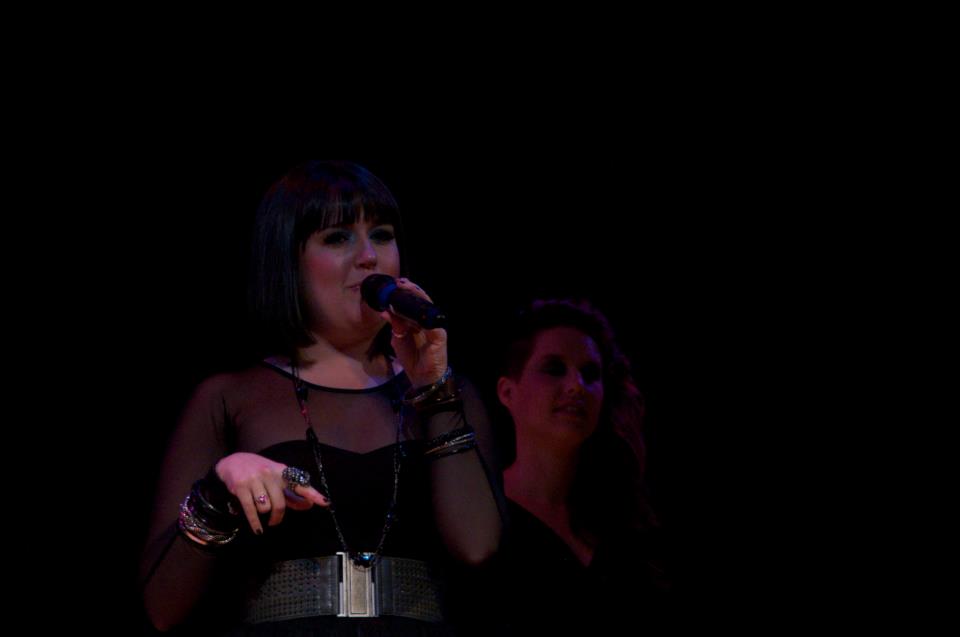
As the judges deliberated, I made my own picks for the night. I saw four clear frontrunners—it’s always frustrating when my judgment comes down to that because I know at least one of the night’s elite groups isn’t even going to place. The Accidentals and SoCal VoCals, for all of their differences in style, also had some marked similarities in that they subverted the audience’s expectations at every turn and each made at least one “over done” song fresh, and uniquely their own. While either group would have made very worthy ICCA champions, I felt there were two other groups all the more deserving of this particular night’s top honors. The ScatterTones brought the total package between their brilliant arrangements, sterling leads, and captivating visuals. And there there was Voices in Your Head. I touched upon this earlier in this review, and went at it in greater depth in my review of the ICCA South Semifinal: when you’re considering who deserves to walk away as champions at the highest levels of competition, you need to look toward acts that not only hit all of their notes but that innovate—first and foremost in their sound, but also visually and in terms of set concept. No act at the Finals told a more cohesive, more compelling, or more original story than Voices in Your Head. Though, on an official level, their act went unrecognized at the end of the night, in my head and my heart, I can’t help but say: on April 30, 2012, Voices in Your Head was the best collegiate a cappella group in the world.
In the end, The SoCal VoCals took home first place, winning their third ICCA Championship (not to mention their third crown in three tries). They finished the night with their encore performance, singing “The Best Thing I Never Had” by Beyonce. Excellent close to a top notch Finals show. My hat is off to the Varsity Vocals production team for their fantastic work putting the season together and to all of the performers who, top to bottom, made this the strongest Finals I’ve heard to date.
Mike Chin’s Picks for the Night
Overall Placement:
1. Voices in Your Head
2. The ScatterTones
3. TIE: The SoCal VoCals and The Accidentals
Best Soloist:
1. The SoCal VoCals for "Tightrope"
2. Out of the Blue for “Something’s Got a Hold On Me”
3. The ScatterTones for "No Woman, No Cry"
4. The Accidentals for "Bridge Over Troubled Waters"
Best Visual Presentation:
1. Voices in Your Head for "Titanium"
2. The Accidentals for "Never Say Never"
3. The ScatterTones for “End of Time”
Best Arrangement:
1. The ScatterTones for “No Woman, No Cry"
2. Voices in Your Head for "We Found Love"
3. The Accidentals for "Bridge over Troubled Waters"
Best Vocal Percussion:
1. The Accidentals
2. The SoCal VoCals
3. The ScatterTones
ICCA Official Results
Overall Placement:
1. The SoCal VoCals
2. The ScatterTones
3. All the King’s Men
Outstanding Soloist: Oluwasegun Oluwadele from The SoCal VoCals for “Tightrope”
Outstanding Vocal Percussion: Schafer Gray from The Accidentals
Outstanding Choreography: Caitlin Calfas from The ScatterTones